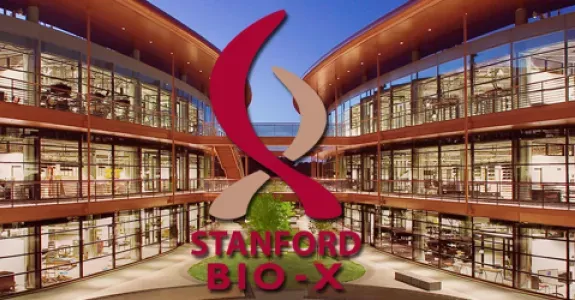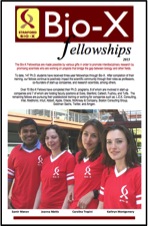
Welcome to the biweekly electronic newsletter from Stanford Bio-X for members of the Bio-X Corporate Forum. Please contact us if you would like to be added or removed from this distribution list, or if you have any questions about Stanford Bio-X or Stanford University.
Last week, Bio-X celebrated the 10th Anniversary of the James H. Clark Center, the hub of Bio-X. Check out CLARK CENTER @ 10X on the SPLASH PAGE as well as the Bio-X Timeline over the last 15 years!!
Stanford scientists Thomas Südhof and Michael Levitt win Nobel Prizes!
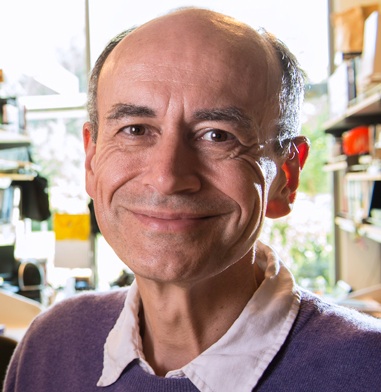
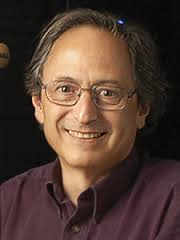 An amazing last week for Stanford University: Congratulations to faculty members THOMAS SÜDHOF, MD, professor of molecular and cellular physiology at the Stanford University School of Medicine, who has won the 2013 Nobel Prize in Physiology or Medicine, and MICHAEL LEVITT, PhD, professor of structural biology also at the Stanford University School of Medicine, who has won the 2013 Nobel Prize in Chemistry. Full articles about the Nobel prizes are linked to the faculty's names.
An amazing last week for Stanford University: Congratulations to faculty members THOMAS SÜDHOF, MD, professor of molecular and cellular physiology at the Stanford University School of Medicine, who has won the 2013 Nobel Prize in Physiology or Medicine, and MICHAEL LEVITT, PhD, professor of structural biology also at the Stanford University School of Medicine, who has won the 2013 Nobel Prize in Chemistry. Full articles about the Nobel prizes are linked to the faculty's names.
To read about the science behind the faculty's Nobel Prizes, please click below:
The science behind Thomas Südhof's Nobel Prize
The science behind Michael Levitt's Nobel Prize
Seed Grants
 SEED GRANTS FOR SUCCESS - Stanford Bio-X Interdisciplinary Initiatives Program (IIP)
SEED GRANTS FOR SUCCESS - Stanford Bio-X Interdisciplinary Initiatives Program (IIP)
The Bio-X Interdisciplinary Initiatives Program represents a key Stanford Initiative to address challenges in human health. The IIP awards approximately $3 million every other year in the form of two-year grants averaging about $150,000 each. From its inception in 2000 through the fifth round in 2010, the program has provided critical early-stage funding to 114 different interdisciplinary projects, involving collaborations from over 300 faculty members, and creating over 450 teams from five different Stanford schools. From just the first 5 rounds, the IIP awards have resulted in a 10-fold-plus return on investment, as well as hundreds of publications, dozens of patents filed, and most importantly, the acceleration of scientific discovery and innovation.
In 2012, Stanford Bio-X selected 23 new seed grant projects as the winners of the 6th round. Please go here to view the list of awardees, along with the titles of their projects and the abstracts of the research. Competition was intense as the awardees were chosen from 118 Letters of Intent (LOIs). Selection criteria included innovation, high-reward, and interdisciplinary collaboration. (To view the 114 other IIP projects that have been funded from the first 5 rounds, please click here.) In addition, SANOFI has also funded 4 new Bio-X IIP Seed Grant projects from round 6!
On Monday, August 26, 2013, Bio-X had its second annual IIP Symposium of the year at the Clark Center, which highlights projects that exemplify the Stanford Bio-X mission of crossing boundaries to bring about interdisciplinary research and solutions in the field of life bioscience. The symposium was a huge success with over 300 people attending this event, which included 8 oral presentations and 136 poster presentations. Recorded talks from the symposium will be uploaded soon. If you'd like to view the talks for previous symposia through the years, please click here.
We are cultivating and are highly successful in building meaningful collaborations with numerous corporate colleagues. New collaborations through our seed grant projects are highly encouraged. To learn about how to get involved, please contact Dr. Hanwei Li or Dr. Heideh Fattaey.
Fellowships
Every year, graduate students and postdoctoral scholars of Bio-X affiliated faculty are highly encouraged to apply for the Bio-X Fellowships, which are awarded to research projects that are interdisciplinary and utilize the technologies of different fields to solve different biological questions. Students are encouraged to work collaboratively with professors of different departments, thus creating cross-disciplinary relationships among the different Stanford schools. Our fellows have conducted exciting research, resulting in publications in high-impact journals and have been offered excellent positions in industry and academia. To date, Stanford Bio-X has a total of 152 Fellows.
On June 26th, Bio-X held its annual Bio-X Fellows Symposium, where there were four 15-minute oral presentations followed by one-minute spiels from current fellows. The 25 newest fellows selected this year were also announced, and about 100 attendees came to the symposium. Please click on the "Bio-X Fellows Symposium" link above for the agenda and titles of the talks, and on the icon of the brochure above for the updated and latest Bio-X Fellowships brochure.
To view the numerous projects that have been awarded over the years, please click here.
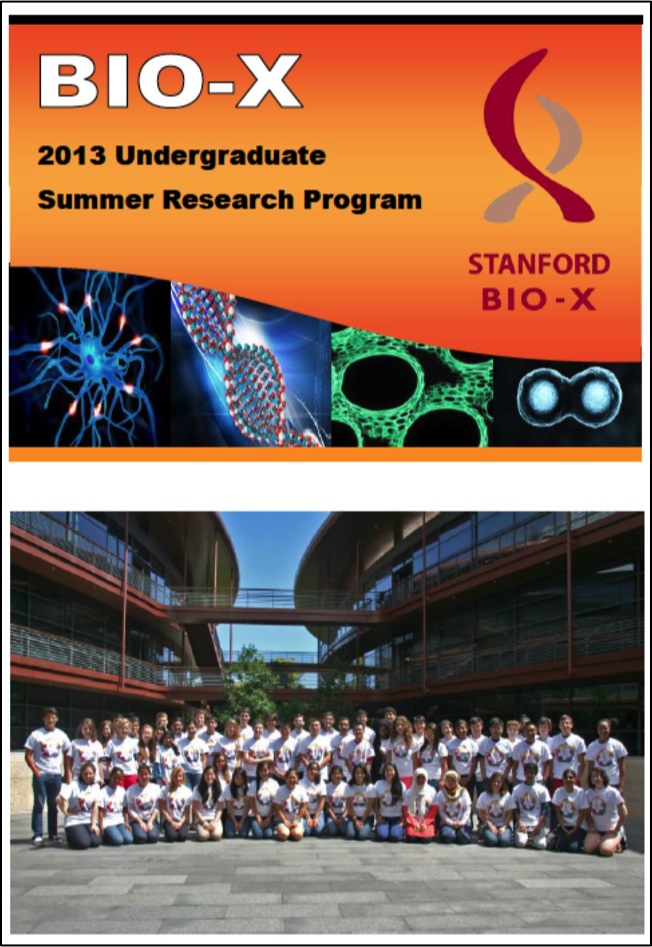 BIO-X UNDERGRADUATE SUMMER RESEARCH PROGRAM
BIO-X UNDERGRADUATE SUMMER RESEARCH PROGRAM
The Bio-X Undergraduate Summer Research Program supports undergraduate research training through an award designed to support interdisciplinary undergraduate summer research projects. The program is an invaluable opportunity for students to conduct hands-on research, learn how to carry out experiments in the laboratory, and develop the skills to read and analyze scientific literature.
This program is eligible to Stanford students who want to work in the labs of Bio-X affiliated faculty. To date, 241 students have been awarded the opportunity to participate in the Bio-X Undergraduate Summer Research Program. This summer is Stanford Bio-X's 8th round of USRP.
Participating undergraduates are also required to present poster presentations on the research that they've conducted during the program. Please click here for title lists of past posters that our undergraduates have presented.
Many fruitful collaborations and relationships have been established with industry through fellowships. Please contact Dr. Hanwei Li or Dr. Heideh Fattaey if you'd like to learn more about how to get involved with these fellowship programs.
News
Scientists create technique for high-speed, low-cost epigenomic mapping
Bio-X Affiliated Faculty Howard Chang and William Greenleaf
A new technique developed by researchers at the Stanford University School of Medicine could pave the way to an era of personalized epigenomics. The technique, described in a study published online Oct. 6 in Nature Methods, could quickly yield huge amounts of useful information about which genes are active in particular cells. The technology involved is cheap, fast and easy to use, and all that would be needed from the patient is a blood sample or needle biopsy. As word of the new technique has leaked, dozens of researchers around the world have begun putting it to work in their labs, said Howard Chang, MD, PhD, professor of dermatology at Stanford and a Howard Hughes Medical Institute early-career scientist. Chang shared senior authorship of the study with William Greenleaf, PhD, assistant professor of genetics. The lead author is graduate student Jason Buenrostro.

 Stanford scientists use 'wired microbes' to generate electricity from sewage
Stanford scientists use 'wired microbes' to generate electricity from sewage
Bio-X Affiliated Faculty Yi Cui and Craig Criddle
Engineers at Stanford University have devised a new way to generate electricity from sewage using naturally-occurring “wired microbes” as mini power plants, producing electricity as they digest plant and animal waste. In a paper published in the Proceedings of the National Academy of Sciences, co-authors Yi Cui, a materials scientist, Craig Criddle, an environmental engineer, and Xing Xie, an interdisciplinary fellow, call their invention a microbial battery. One day they hope it will be used in places such as sewage treatment plants, or to break down organic pollutants in the “dead zones” of lakes and coastal waters where fertilizer runoff and other organic waste can deplete oxygen levels and suffocate marine life.
Stanford scientists awarded grants for innovative research
Michael Lin (Pediatrics, Bio-X affiliated)
Catherine Blish (Medicine, Bio-X affiliated)
Maximilian Diehn (Radiation Oncology)
Elizabeth Sattely (Chemical Engineering, Bio-X affiliated)
Thomas Rando (Neurology, Bio-X affiliated)
Tony Wyss-Coray (Neurology)
David Relman (Microbiology & Immunology, Bio-X affiliated)
Susan Holmes (Statistics, Bio-X affiliated)
Eight Stanford University scientists have received more than $17 million from the National Institutes of Health that will enable them to pursue innovative research in biomedicine. They are among the recipients of 78 Pioneer, New Innovator, Transformative Research and Early Independence Awards presented by the NIH in 2013. The awards, which were announced today, aim to encourage high-risk, high-reward approaches to biomedical and behavioral research. "These awards recognize and support the kind of creative thinking that has put Stanford on the map as the epicenter of innovation," said Lloyd Minor, MD, dean of the School of Medicine. "I would like to extend my congratulations to these eight scientists whose unconventional ideas are changing biomedicine." This year, the NIH awarded approximately $123 million for 12 Pioneer Awards, 41 New Innovator Awards, 10 Transformative Research Awards and 15 Early Independence Awards (the only category in which Stanford is not represented). "NIH is excited to continue support of visionary investigators, among all career stages, pursuing science with the potential to transform scientific fields and accelerate the translation of scientific research into improved health," said NIH director Francis Collins, MD, PhD.
Events
| Biochemistry October 16, 2013, 4 pm - 5 pm Clark Center Auditorium, Stanford, CA FRONTIERS IN BIOLOGY- "The beginning of the end: Scaffolds and the initiation of autophagy" Speaker: James Hurley, UCB |
Radiology October 18, 2013, 11 am - 12 pm Li Ka Shing Center, LK 101, Stanford , CA CCSB Seminar Series - "Stratifying cancer into subtypes using knowledge of molecular networks" Speaker: Trey Ideker, PhD, UCSD |
| Immunology October 22, 2013, 4:15 pm - 5:15 pm Alway M106, Stanford, CA "A Proteomic-genomic Investigation of MHC Peptide Ligands" Speaker: Josh Elias, PhD, Stanford University |
Neurosciences Institute October 24, 2013, 12 pm - 1 pm Clark Center Auditorium, Stanford, CA "Homeostatic Control of Neural Function: From Phenomenology to Molecular Design" Speaker: Graeme Davis, PhD, UCSF |
Resources
| Stanford University |
| Stanford Bio-X |
| Bio-X Seed Grants The Stanford Bio-X Interdisciplinary Initiatives Program (IIP) provides seed funding for high-risk, high-reward, collaborative projects across the university, and have been highly successful in fostering transformative research. |
| Office of Technology and Licensing "Techfinder" Search the OTL Technology Portal to find technologies available for licensing from Stanford. |
| Stanford Center for Professional Development - Take advantage of your FREE membership! - Take online graduate courses in engineering, leadership and management, bioscience, and more. - Register for free webinars and seminars, and gets discounts on courses. |
| Stanford Biodesign Video Tutorials on how FDA approves medical devices A series of video briefs recently produced by the Stanford Biodesign Program teaches innovators how to get a medical device approved for use in the United States. This free, online library of 60 videos provides detailed information on the Food and Drug Administration regulatory process, short case studies and advice on interacting with the FDA. |
To learn more about Stanford Bio-X or Stanford University, please contact Dr. Hanwei Li, the Bio-X Corporate Forum Liaison, at 650-725-1523 or lhanwei1@stanford.edu, or Dr. Heideh Fattaey, the Executive Director of Bio-X Operations and Programs, at 650-799-1608 or hfattaey@stanford.edu.
